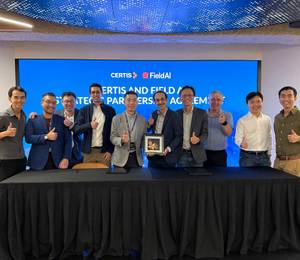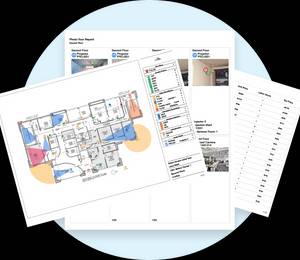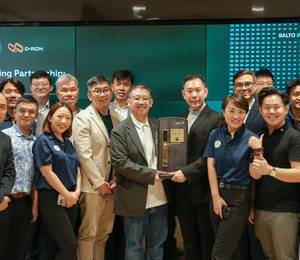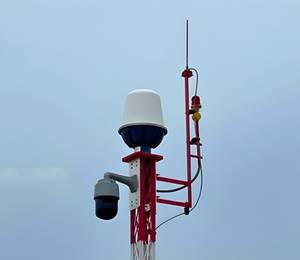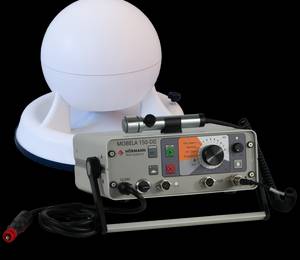ISC West, sponsored by the Security Industry Association (SIA), is the largest converged security event of the year, constantly evolving to educate security professionals on the tools and skills needed to protect against today’s emerging cyber and physical security threats and the anticipated ones of tomorrow. Following SIA’s research to develop the Security Megatrends™ –an annual research project that reports on the top trends reshaping the security industry – SIA and ISC West worked together to make sure those themes would be addressed at the 2018 event, particularly as part of the SIA Education@ISC lineup. The trends range from the booming growth of the IoT to more efficient ways to manage Big Data.
ISC Security Events is an iconic, 50-year-old brand that has its finger on the pulse of the integrated cyber-physical security industry, allowing it to seamlessly evolve to cover every emerging threat. Through its partnership with SIA, ISC West has organized a comprehensive program for attendees from all industries, roles and functions across physical, IT and IoT security. ISC West 2018 will take place at the Sands Expo in Las Vegas, NV (SIA Education@ISC: April 10 – 12 | Exhibit Hall: April 11 - 13).
“A top priority is making education one of the most valuable, robust parts of ISC West,” said Don Erickson, CEO of SIA. “We identified these top 10 trends – what we call the Security Megatrends™ – and reviewed how they would pose significant impacts on 2018’s converged security landscape. We then used these insights to lay the groundwork for the 85+ educational sessions we’re offering at the ISC West show, making it possible for attendees to leave feeling confident and equipped to tackle the emerging security threats, as well as the business challenges and opportunities that inevitably come their way.”
The 2018 Security Megatrends™:
Trend 1: Booming Growth of the IoT
Both enterprise and consumer-connected solutions are major focuses at ISC West, and will be explored in-depth at the Connected Security Expo and the Connected Home areas on the Show Floor.
According to Gartner, businesses are predicted to represent more than half of overall IoT spending in 2017 (57 percent). Going into 2018, cross-industry devices, like those used in smart buildings (i.e., LED lighting and physical security systems) will drive this spending trend. The IoT is creating both challenges and capabilities for the physical security and risk management sectors. When implemented and properly secured, the IoT will provide predictive analytics, the ability to deliver a more personalized experience to users, and complete situational awareness from top to bottom.
Trend 2: Cyber Meets Physical Security
As the cyber and physical security sectors continue to merge, manufacturers are dealing with increasingly hostile and complex environments. To take security to the next level, manufacturers and systems integrators need to offer more advanced cybersafeguards to protect network connected devices.
Security integrators are moving in the right direction and are beginning to offer cybersecurity as a service as they continue to grow their businesses from hardware-centric to solution-oriented models. And customers rightfully expect service providers to be their trusted advisors – however, integrators will only be able to deliver if they continue to evolve towards total convergence.
Trend 3: Accessing and Analyzing Smart and Big Data
According to IDC, less than .5 percent of all data is ever analyzed and used, which is alarming considering all the buried insights that exist but aren’t being leveraged. According to Lisa Roy, Vice President, Integration and Commercial Operations, Building Solutions-North America of Johnson Controls, “Big data is life changing in how we operate buildings and determining our future role. It’s all about how to pull that information out that benefits the customer. Big data changes the way in which we service customers.”
Augmented reality (AR), artificial intelligence (AI) and video analytics will continue to be important for acquiring insights, but physical security experts are already anticipating how Big Data will impact the industry beyond these technologies. With so much information available, security practitioners need to have a plan for the data they are collecting, as well as a realistic risk assessment of the exposure of this data to their companies and clients.
Find it at ISC West: Visit Big Data: How to Apply it to Physical Security Programs and Creating a Smart Cities Solution by leveraging IoT, Video and Big Data to learn more.
Trend 4: Evolution of Risk Management
Traditionally, the organizational process in security has been a siloed, single-lane approach. However, the most successful management models include all corporate stakeholders and possible sources of information to circumvent loss and reduce the potential for insider risk threats. We’re heading in the right direction as risk management and planning has broadened to be more holistic, and collaboration between all stakeholders, beyond just within technology/security roles, is becoming increasingly prominent. However, this needs to happen even more, to become the norm, not an exception.
As we look to innovative technologies that bring about new risks and considerations, such as drones, this coordinated approach becomes even more imperative. The Unmanned Security & Safety Expo @ ISC West will further explore risk management for unmanned aerial and ground vehicles (UAVs, UGVs).
Trend 5: Transformation of the Channel
There’s an ongoing, heightened transformation of the security installer and integrator business into everything as a service, with new models embracing interactive products, and the DIY and self-installation markets. Unusual suspects from the IT sector have entered the security business, and traditional security monitoring companies are now offering DIY or self-install systems.
This transformation of the channel requires some changes. The traditional security provider must continue to change and focus on value-added services that heighten the customer experience, while delivering convenience and intelligence expected by their customers. From the end user’s perspective, security executives are looking for security providers who can collaborate fully to address risks and assist not only with security and safety, but contribute to business continuity and promote a tangible return on investment.
Trend 6: Shakeup of the Status quo: Entrance of Entrepreneurial Buyers and Outsiders
Strategic acquirers are merging with traditional security manufacturers and installation companies to focus on data analytics, convergence and IoT. According to Jay Darfler, SVP, Emerging Markets and Innovation of ADT Security Services, “Disruption and innovation can come at you from a hundred different angles. You have to divide what your strengths and your core innovation to focus on.”
The industry’s biggest players are getting even bigger as new technologies and applications enter new markets, like residential, and even spill over into small-to-medium business markets. However, there are challenges, and the longtime recurring monthly revenue (RMR) centric model is changing from hardware and project-based to income from service, maintenance and remote monitoring from cloud and interactive services. And while service creates value, monetary values inevitably change. As this shift continues, norms that have been in place for decades are changing, too, including increased subscriber acquisition costs (SAC), decreased RMR margins, increased technology obsolescence, shorter product development cycles, no contracts, and interoperability.
Trend 7: Mobile Everything
Mobile technology is becoming synonymous with access identity and credentialing. Beyond the obvious consumer value, smartphones will be transformative within access control, enabling both cost reductions and end-user benefits.
By itself, mobile credentials in access control is a strong value proposition, but mobile credentials are also able to provide an integrated and higher value system for the user while it promotes new services and revenue streams.
Trend 8: Control Through Cloud: Driving Greater Efficiencies and Promoting Managed Services
The global cloud computing service market is expanding exponentially. Growing connectivity, convergence and integration with IoT, mobile technology, and a wide range of applications and services is driving the shift towards cloud-hosting – including public, private and hybrid.
The cloud is an enabling technology. It allows the user greater access to managing their premises, and opens the door to new service options for solutions providers to offer. It gives them the opportunity to offer managed services and subsequent RMR that is highly attainable, providing inherent opportunities to add new revenue streams with the cloud’s “always on, always accessible” model. With this, systems integrators can become total solutions providers that are reliably available 24/7, leading to greater confidence and customer satisfaction.
Trend 9: Integrating With Social Media
In law enforcement and emergency communications/operations, social media has become critical in identifying active shooters, criminal activities or other potential threats or disasters in real-time.
As the IoT and other disciplines continue to converge, social media will be part of the transformation of critical information resources. The next step for social media is deeper integration with mass notification and emergency communications—with the ability to disseminate specification information to individuals who may need to be evacuated or take shelter.
Trend 10: Emerging Connected Services: Consumers Want Convenience at Their Fingertips
Sensors embedded in a wide range of smart home devices and appliances will deliver near real-time analytics on changes within home environments. The cloud is a key component of this, providing seamless access and visibility. Visibility is especially important for service and maintenance of remote sites, reducing expensive site visits and labor costs – resulting in a better customer experience.
Security providers who can adapt with this changing landscape will prove invaluable to the commercial market, lowering their business costs in areas like energy management.
“We’re laser-focused on providing attendees with all-inclusive education at ISC West, which is why we’re thrilled to have SIA as our trusted partner,” said Will Wise, Group Vice President of ISC Security Events. “These top 10 trends really hit on what’s to come at the show. These themes impact nearly every type of attendee in some way, from government/enterprise security decision-makers and end-users, to integrators, installers and dealers. This year’s show is designed to be the most educational and information-packed yet, and we’re looking forward to seeing the peer-to-peer mindshare that takes place.”
